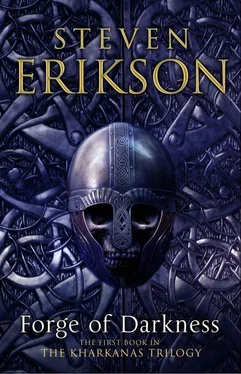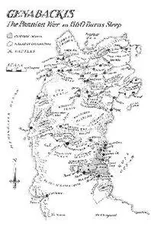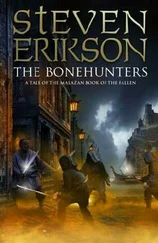Steven Erikson - Forge of Darkness
Здесь есть возможность читать онлайн «Steven Erikson - Forge of Darkness» весь текст электронной книги совершенно бесплатно (целиком полную версию без сокращений). В некоторых случаях можно слушать аудио, скачать через торрент в формате fb2 и присутствует краткое содержание. Жанр: Фэнтези, на английском языке. Описание произведения, (предисловие) а так же отзывы посетителей доступны на портале библиотеки ЛибКат.
- Название:Forge of Darkness
- Автор:
- Жанр:
- Год:неизвестен
- ISBN:нет данных
- Рейтинг книги:3 / 5. Голосов: 1
-
Избранное:Добавить в избранное
- Отзывы:
-
Ваша оценка:
- 60
- 1
- 2
- 3
- 4
- 5
Forge of Darkness: краткое содержание, описание и аннотация
Предлагаем к чтению аннотацию, описание, краткое содержание или предисловие (зависит от того, что написал сам автор книги «Forge of Darkness»). Если вы не нашли необходимую информацию о книге — напишите в комментариях, мы постараемся отыскать её.
Forge of Darkness — читать онлайн бесплатно полную книгу (весь текст) целиком
Ниже представлен текст книги, разбитый по страницам. Система сохранения места последней прочитанной страницы, позволяет с удобством читать онлайн бесплатно книгу «Forge of Darkness», без необходимости каждый раз заново искать на чём Вы остановились. Поставьте закладку, и сможете в любой момент перейти на страницу, на которой закончили чтение.
Интервал:
Закладка:
How could it be otherwise, with so much mud in the water between them? Mud and swirling currents, the endless, helpless stirring of silts so that nothing could ever come to rest.
But on this day, she had seen a dying old man and a heartbroken, guilt-ridden commander stand face to face, and make peace with each other.
They walked now, as would old friends, up to the house, and then disappeared inside.
Mother Dark, you have found a worthy husband here. A most worthy husband.
When she swung round to return to her horse, she looked up and saw, whipping hard in the breeze, the Legion’s banner, high above the gatehouse.
It was done.
Urusander’s Legion had returned to Kurald Galain.
Against the bright blue, cloudless sky, the banner was like a golden blade, torn from the sun itself. She squinted at it. Painters called that colour liossan.
In the wake of terrible fever, in a strange, warm stillness that filled her being, Renarr opened her eyes. She saw her father, and with him strangers. The twisted, damaged vision that had claimed her left eye was gone now, and everything seemed impossibly clear. Even the pain of her swollen face was fast fading.
Her father leaned closer. ‘Little girl,’ he said, his eyes wet. ‘Do you see who’s here? It’s Lord Urusander himself.’
Her gaze slipped past her father, to the man standing near, and in the Lord’s face she saw the son. Renarr looked away.
‘Changes, little girl,’ said Gurren, in a tone she’d never before heard from him. ‘In your whole world, Renarr. Changes, blessed changes.’
There was no denying that. Millick was dead. The man she loved was dead, murdered by the Lord’s son. And now here stood the Lord, and her father babbling about how they were going to live in the Great House, and how she would be taken care of from now on, and the Lord was smiling and nodding, and all she could think about was Millick, to whom she had told everything because he saw that she wasn’t the same any more — Millick, weeping and drunk and feebly trying to put her face back together, on his knees beside her telling her how his cousins had got the story of her confession out of him after a cask of ale, and how they laughed at him and called her a whore to his face, until he was driven to madness. Blind rage, he kept saying, trying to explain himself, how his fists just lashed out unseeing when she came upon him beating Eldin and Orult behind the house, how he punched not knowing whom he punched.
And how Witch Hale got her story all wrong, because Millick had gone in hiding from his cousins and their friends, and Renarr got fevered and had to crawl home in the middle of the night, and Renarr’s jaw was too swollen and she couldn’t get the right words past her broken mouth.
Changes. It was a day of changes all right.
THIRTEEN
Kadaspala was not a believer in gods, but he knew that belief could create them. And once made, they bred in kind. He had seen places where discord thrived, where violence spun roots through soil and flesh both, and the only propitiation left to those who dwelt there was the spilling of yet more blood. These were venal gods, the vicious spawn of a stew of wretched emotions and desires. There was no master and no slave: god and mortal fed on each other, like lovers sharing a vile fetish.
He knew that there was power in emotion, and that it could spill out to soak the ground, to stain stone and twist wood; that it could poison children and so renew the malign cycle, generation upon generation. Such people made of their home a god’s lap, and they curled tight within its comforting, familiar confines.
Kadaspala wanted none of it, and yet he was never as immune as he would have liked: even the pronouncement that he stood outside such things was itself an illusion. He was not a believer in gods, but he had his own. They came to him in the simplest of all forms, eschewing even shape and, at times, substance itself. They came to him in a flood, with every moment — indeed, even in his sleep and the dream worlds that haunted it. They howled. They whispered. They caressed. Sometimes, they lied.
His gods were colours, but he knew them not. They bore heady emotions and before them, in moments of weakness or vulnerability, he would reel, or cry out, seeking to turn away. But their calls would bring him back, helpless, a soul on its knees. At times he could taste them, or feel their heat upon his skin. At times he could smell them, redolent with promise and quick to steal from his memories, and so claim those memories for their own. So abject had his worship become that he now saw himself in colours — the landscape of his mind, the surge and ebb of emotions, the meaningless cascades behind the lids of his eyes when shut against the outside world; he knew the blues, purples, greens and reds of his blood; he knew the flushed pink of his bones, with their carmine cores; he knew the sunset hues of his muscles, the silvered lakes and fungal mottling of his organs. He saw flowers in human skin and could smell their perfumes, or, at times, the musty readiness of desire — that yearn to touch and to feel.
The gods of colour came in lovemaking. They came in the violence of war and the butchering of animals, in the cutting down of wheat. They came in the moment of birth and in the wonder of childhood — was it not said that newborn babies saw naught but colours? They came in the muted tones of grief, in the convulsions of pain and injury and disease. They came in the fires of rage, the gelid grip of fear — and all that they touched they then stained, for all time.
There was but one place and one time when the gods of colour withdrew, vanished from the ken of mortals, and that place, that time, was death.
Kadaspala worshipped colour. It was the gift of light; and in its tones, heavy and light, faint and rich, was painted all of life.
When he thought of an insensate world, made of insensate things, he saw a world of death, a realm of incalculable loss, and that was a place to fear. Without eyes to see and without a mind to make order out of chaos, and so bring comprehension, such a world was where the gods went to die. Nothing witnessed, and so nothing renewed. Nothing seen, and so nothing found. Nothing outside, and so nothing inside.
It was midday. He rode through a forest, where on all sides the sun’s light fought its way down to the ground, touching faint here, bold there. Its gifts were brush-strokes of colour. He had a habit of subtly painting with the fingers of his right hand, making small caresses in the air — he needed no brush; he needed only his eyes and his mind and the imagination conjured in the space between them. He made shapes with deft twitches of those fingers, and then filled them with sweet colour — and each one was a prayer, an offering to his gods, proof of his love, his loyalty. If others saw the motions at the end of his right hand, they no doubt thought them twitches, some locked-in pattern of confused nerves. But the truth was, those fingers painted reality, and for all Kadaspala knew, they gave proof to all that he saw and all that existed to be seen.
He understood why death and stillness were bound together. In stillness the inside was silent. The living conversation was at an end. Fingers did not move, the world was not painted into life, and the eyes, staring unseen, had lost sight of the gods of colour. When looking upon the face of a dead person, when looking into those flat eyes, he could see the truth of his convictions.
It was midday. The sun fought its way down and the gods fluttered, dipped and filled patches of brilliance amidst gloom and shadow, and Kadaspala sat on his mule, noting in a distracted fashion the thin wisps of smoke curling round his mount’s knobby ankles, but most of his attention was upon the face, and the eyes, of the corpse laid out on the ground before him.
Читать дальшеИнтервал:
Закладка:
Похожие книги на «Forge of Darkness»
Представляем Вашему вниманию похожие книги на «Forge of Darkness» списком для выбора. Мы отобрали схожую по названию и смыслу литературу в надежде предоставить читателям больше вариантов отыскать новые, интересные, ещё непрочитанные произведения.
Обсуждение, отзывы о книге «Forge of Darkness» и просто собственные мнения читателей. Оставьте ваши комментарии, напишите, что Вы думаете о произведении, его смысле или главных героях. Укажите что конкретно понравилось, а что нет, и почему Вы так считаете.












